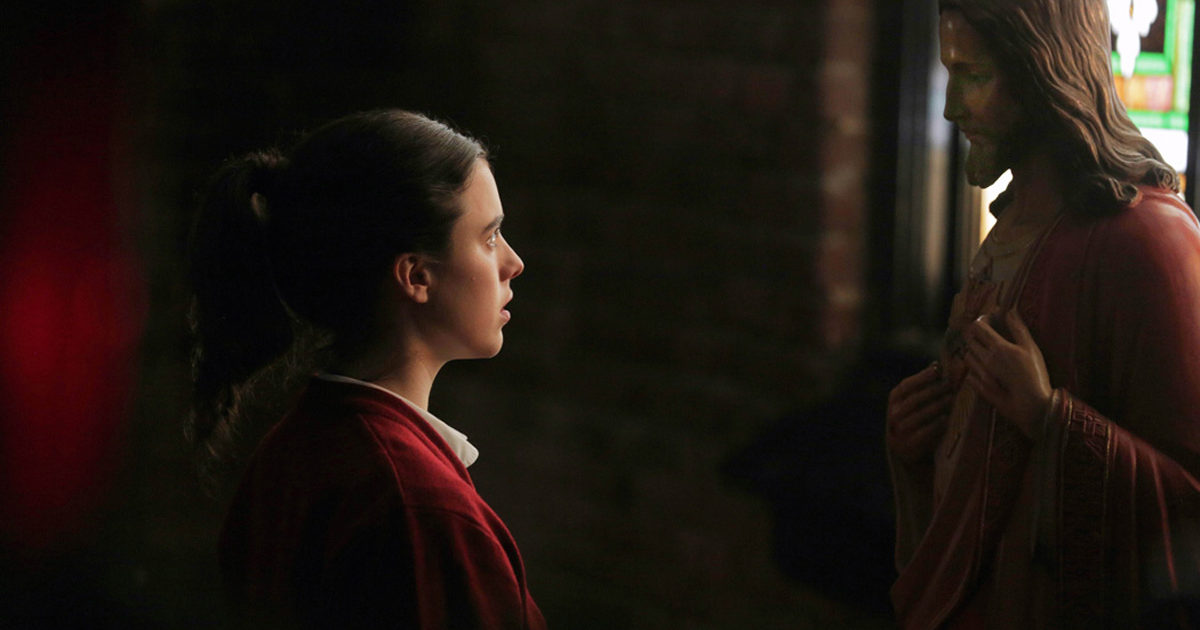
Without wanting to go full “war on Christmas” here, I don’t think it would a stretch to say the cinematic landscape is not particularly bountiful with serious explorations of the Christian faith. It mostly falls into the range between reductive family dramas like Heaven is For Real, near-faithless epics like Exodus: Gods and Kings, or flippant dismissals of the whole scene like Sausage Party. I wasn’t particularly certain Sundance would be the place to go for an earnest depiction, but I wandered into this Vatican II-era nun drama nonetheless, hoping for some spark of honest engagement. I got a good deal more than a spark in return.
Cathleen (Margaret Qualley), despite having not been raised Catholic, decides at age 17 to become a nun. She knows the process will be difficult and the commitment grave, but the secular world in which her mother (Julianne Nicholson) raised her hasn’t provided half the satisfaction and fulfillment she’s received from Mass. She enrolls with a particularly strict convent, run by a definitively old-school Mother Superior (Melissa Leo), but finds degrees of comfort from her teacher, Sister Mary Grace (Dianna Agron), and her classmates. Many of them came to the nunhood with little idea of what they were in for. Most are good church girls. Some were more or less forced by family. One was inspired by the Audrey Hepburn film The Nun’s Story. Like a lot of young people, they’re living by ideals without a full appreciation of what they’re in for.
Writer/director Margaret Betts, making her narrative debut, does not judge these girls for their short-sightedness. She’s very curious about what drives them, and sympathetic to when their illusions are shattered. A nun’s life in the late 1950s is shown to be extremely structured, revolving around daily Mass, prayer, silence, and devotion, with any sort of physical affection strictly forbidden and no access to the outside world. They are meant to live purely in devotion to God. Vatican II hangs overhead, with the potential to change much of that, but Mother Superior is trying to stall its implementation as much as possible. When its terms for nuns, changes that never received much mention during my Catholic education, are finally revealed, one can’t help but feel immense sympathy for her position.
But this doesn’t make her practices any less regrettable. She comes from the last vestiges of corporal punishment, insisting the nuns who step out of line abuse themselves to atone for missteps. And as Cathleen is denied human touch and starts to develop an eating disorder, such violence starts to feel like more like a release than a reprimand. Qualley has done impressive work on The Leftovers, but this is a much more demanding role, and she plays Cathleen’s early confidence and late desperation – as well as the bridge between the two – extremely well. She recognizes that teenagers are naturally prideful, and that much of Cathleen’s resistance to help comes more from a place of pride than a place of faith.
The middle of the film is so good, in fact, that it makes all the clearer how awkward the start and finish are. An awkward introductory voiceover about the importance of love in religion kicks things off, and the end – which hinges on a major decision – feels completely cobbled together and underdeveloped. It’s hard for me to believe that something so otherwise considerate could be so sloppy on both ends, and it’s possible they’ll continue to work on the film between the festival premiere and its eventual release (Sony Pictures Classics has picked it up for distribution), but for now, consider them a couple of minor missteps in an otherwise-thrilling melodrama.


